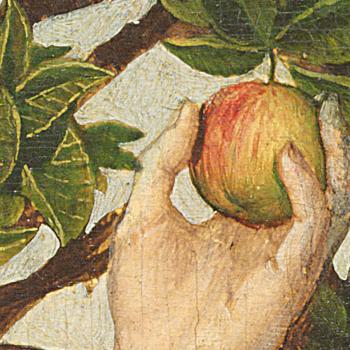
I often look back on popular worship songs and wince, seeing the harm inherent in the lyrics. I don’t doubt that they were written with good intentions and sung sincerely by worshippers the world over, but the truth is, if we regularly bathe our minds in an idea, we subconsciously absorb the message. If the message in the words promotes wellbeing, then that can be a powerful tool for positive change, but if there’s poison in the pot, it gets into our systems over time. For me, ‘less of me and more of you’ carries a seed of self-rejection that should not be allowed to germinate.
In the next couple of articles, I’m going to be looking at harmful ideas that have found their way into popular worship music but will start today with ‘less of me and more of you’.
I’m not going to single out a specific worship ministry, because the notion of ‘less of me and more of you’ can be found in a host of songs, written over the past fifty years. The rejection of the self is a conscious and even ubiquitous aspect of Reformed, Evangelical, Charismatic, and Pentecostal thinking, affecting the many millions of believers in those traditions.
We can’t get more of God
I’m a big fan of growth and of the mystical journey, which is a walk into intimate knowledge of the divine, but it would be false to say we get ‘more’ of him. Nobody has more of God than anyone else. For me, the idea of getting more of God is a failure to recognise what has already been given to us.
2 Corinthians 5:17 – Therefore, if anyone is in Christ, he is a new creation. The old has passed away; behold, the new has come.
2 Timothy 1:7 – For God gave us a spirit not of fear but of power and love and self-control.
Ephesians 2:6 – And God raised us up with Christ and seated us with him in the heavenly realms in Christ Jesus
Romans 8:16 – The Spirit himself testifies with our spirit that we are God’s children.
Ephesians 1:13-14 – When you believed, you were marked in him with a seal, the promised Holy Spirit, who is a deposit guaranteeing our inheritance
2 Peter 1:3 – His divine power has granted to us all things that pertain to life and godliness, through the knowledge of him who called us to his own glory and excellence.
As we mature, we might discover more about God and yield more completely to love, but that is the unpacking of a gift that has already been given rather than an accumulation of divine substance. I can’t abide songs that beg the Holy Spirit to ‘come’ or ‘fill us up’. Why plead for God to ‘turn up’ when he is already in us? If we want to walk more closely with God, we just need to tune in, and we do that by spending time with him, which of course looks different for every individual.
The begging is desperate and woeful, undermining our faith every time we do it. These days, I only sing worship songs that express gratitude or some other positive reflection on what we’ve been given in Christ, who God is, and how wonderful it is to be in his presence. When worship becomes naval gazing, or obsessed with suffering, or in some way desperate, I sit down and meditate instead. I’m not letting anyone drag me down, no matter the sincerity of their musical performance.
Belittling ourselves is not an act of worship
I reject the idea that God might want us to become a reduced or diminished version of ourselves, as if our personalities are unwholesome and a hindrance to spirituality. Which of us would say to our children that we want them to be less themselves, less engaging, less creative, less passionate?
As a Christian teenager, I saw friends of mine sacrifice themselves on the altar of belittlement, convinced they were battling ‘the flesh’ when really, they were sabotaging their own happiness. One lad was a fantastically talented footballer, but he gave it up because he saw it as a source of pride. Others stopped listening to the music that fed their souls because they thought it was ‘worldly’. The Stone Roses, Bob Marley, and Pink Floyd were replaced with Petra, DC Talk, and Amy Grant – perhaps the saddest exchange possible for a teenager! We made ourselves small and took less pleasure from life, believing that doing so was an act of devotion.
Deconstruction lets you be yourself
Abandoning the heavy religious dogmas of my childhood and early adulthood has led me to believe that God is a good parent in the same ways you and I can be good parents when we love our kids well. He wants us to lead full, satisfying lives, using our gifts and talents to bless the world but also to make us happy. It’s amazing how reactive some folk are to the claim that God wants us to be happy, as if personal happiness is of zero importance. It makes no sense to disregard ourselves so cruelly. Mystical experience tells me that God is emotional, joyful, and fully present, which is exactly what he wants us to be. I’ve written on this in a previous article.
Personally, I’ve found that walking with God has made me a fuller, richer version of myself, letting go of fear and accepting who I am without condition. Greater closeness with God results in the emergence of a more authentic rather than a diminished version of ourselves.
We sing such self-rejecting, belittling songs, as if the only way to grow spiritually is to make ourselves tiny and insignificant, which is not consistent with the high value God places on every person.
Psalm 23
The Lord is my shepherd
I shall not want.
He makes me to lie down in green pastures
He leads me beside the still waters.
He restores my soul
He leads me in the paths of righteousness
For His name’s sake.
Yea, though I walk through the valley of the shadow of death,
I will fear no evil
For You are with me
Your rod and Your staff, they comfort me.
You prepare a table before me in the presence of my enemies
You anoint my head with oil
My cup runs over.
Surely goodness and mercy shall follow me
All the days of my life
And I will dwell in the house of the Lord
Forever.
He is our shepherd, who actively guides us to satisfaction and peace. He helps us grow, comforts us in challenging times, prepares a feast for us, serves us at the table, fills us with his Holy Spirit, gives us more than enough, and pursues us with goodness and mercy every day of our lives! We shouldn’t miss the obvious here – our God is overflowing with love and good intentions towards us!
If we want to grow, we need to let go of self-hating dogma and embrace the love of God, which is unconditional. Instead of turning on ourselves, we can know his delight in us. We can see the beauty in ourselves and accept and affirm the same in each other.
Note from the author: All readers are invited to sign up for my newsletter by filling out the box on the right, and for those who want to explore the love of God in greater depth, I’ve written a book on the topic under the pseudonym, James Bewley.













